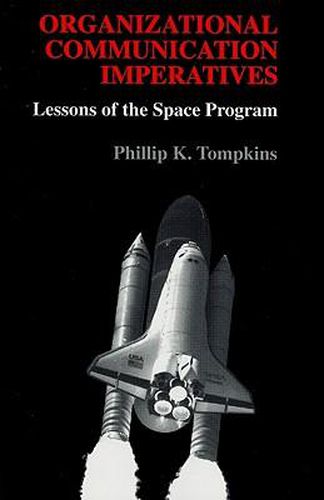Readings Newsletter
Become a Readings Member to make your shopping experience even easier.
Sign in or sign up for free!
You’re not far away from qualifying for FREE standard shipping within Australia
You’ve qualified for FREE standard shipping within Australia
The cart is loading…






Organizational Communication Imperatives: Lessons of the Space Program, by Phillip K. Tompkins, provides unparalleled insight into the communication successes and failures of NASA’s Marshall Space Flight Center. It spans a 25-year period–from the Apollo Program to the present-day dilemmas of the space program. Much of the book focuses on communication problems involved in the Challenger disaster. Tompkins is a master of what Clifford Geertz called thick description. The result is a compelling, richly-detailed case study that brings alive the field of communication to students. Organizational Communication Imperatives eases the job of teaching by providing students with a narrative that stimulates interest, contextualizes abstract principles, and leads students into theory with greater understanding. Through their study of the Marshall Center, students are exposed to
* how complex organizational structure changes over time. * how employees are affected by these changes. * how an organization may react to a major crisis. * how an organization responds to different types of leadership. * what it takes to bring an ailing organization back to health. The text thus provides a more comprehensive insight into the functioning of one organization–rather than attempting to describe how all organizations function–than is offered in any other book of this type. Yet the analysis offered can be applied to any organization to improve communication.
Tompkins’s work as an organizational communication consultant to the Marshall Center during the Apollo Program, under legendary German rocket scientist Wernher von Braun, is well known. In 1990, Tompkins returned to Huntsville to interview top management and assess the Center’s recovery since the Challenger disaster.
The book takes the shape of a first-person narrative, which gives it an accessible, personal style rarely found in textbooks. Students will have no difficulty with comprehension.
It is also unusual to present primary-source findings in a classroom text, as this book does. Students gain a sense of how original research is conducted as they use the book, which encourages development of their critical thinking skills.
Suggested questions for discussion and essays, as well as class projects and exercises, are included in an appendix to assist the instructor in using the book to maximum advantage.
$9.00 standard shipping within Australia
FREE standard shipping within Australia for orders over $100.00
Express & International shipping calculated at checkout
Organizational Communication Imperatives: Lessons of the Space Program, by Phillip K. Tompkins, provides unparalleled insight into the communication successes and failures of NASA’s Marshall Space Flight Center. It spans a 25-year period–from the Apollo Program to the present-day dilemmas of the space program. Much of the book focuses on communication problems involved in the Challenger disaster. Tompkins is a master of what Clifford Geertz called thick description. The result is a compelling, richly-detailed case study that brings alive the field of communication to students. Organizational Communication Imperatives eases the job of teaching by providing students with a narrative that stimulates interest, contextualizes abstract principles, and leads students into theory with greater understanding. Through their study of the Marshall Center, students are exposed to
* how complex organizational structure changes over time. * how employees are affected by these changes. * how an organization may react to a major crisis. * how an organization responds to different types of leadership. * what it takes to bring an ailing organization back to health. The text thus provides a more comprehensive insight into the functioning of one organization–rather than attempting to describe how all organizations function–than is offered in any other book of this type. Yet the analysis offered can be applied to any organization to improve communication.
Tompkins’s work as an organizational communication consultant to the Marshall Center during the Apollo Program, under legendary German rocket scientist Wernher von Braun, is well known. In 1990, Tompkins returned to Huntsville to interview top management and assess the Center’s recovery since the Challenger disaster.
The book takes the shape of a first-person narrative, which gives it an accessible, personal style rarely found in textbooks. Students will have no difficulty with comprehension.
It is also unusual to present primary-source findings in a classroom text, as this book does. Students gain a sense of how original research is conducted as they use the book, which encourages development of their critical thinking skills.
Suggested questions for discussion and essays, as well as class projects and exercises, are included in an appendix to assist the instructor in using the book to maximum advantage.